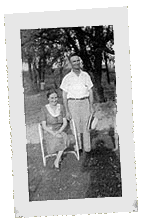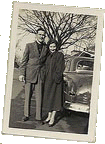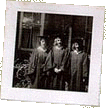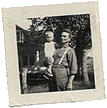The Story 

|
The Story |
Chapter 2 - The Transition Years |
|
|
Scarlette had never been satisfied with farm life and had been looking for an opportunity to move on. Her opportunities were to come, however, in unexpected ways. In her senior year of high school Scarlette was injured in a school bus accident. Using the meager insurance settlement she enrolled in a business college in Louisville, moving away from the family farm and in with a married couple who boarded her. By the end of the first semester, her life was about to undergo more unanticipated changes. The husband of the couple at the boarding house propositioned her. At the same time as she was facing this, Pearl Harbor was bombed and World War Two had begun. Unsure what to do and too nervous to even tell anyone from home, she heard that jobs were readily available in Ohio, where a major military station was shipping men overseas. She left within days and quickly found work as a waitress waiting on servicemen about to be shipped off to war. It was there where she was to meet her future husband, Steve Armstrong, in a remarkable courtship. |


|
|
Scarlette met Steve only once when she waited on his table, and hadn't even spoken to him before he left for the overseas, but they began a powerful correspondence. The first time she spoke to him in person was while he was on a brief leave from the war. Within two weeks of speaking to him for the first time, they were married. |
|
|
When Cora graduated from high school, there was a tremendous shortage of teachers due to the war. The schools had been culling students fresh from high school, granting them an "Emergency Certificate" to teach in the public elementary schools. Cora became a teacher under this plan and stayed home for three years after graduation-in part to remain close to her long-time boyfriend. |
|
|
Ethel however, like Scarlette before her, was determined to establish her independence away from the farm. Ethel decided she wanted to move to Lexington after she graduated, and convinced Cora to come with her. This was a very difficult move given their father's closeness to them, and on the practical level that he would be losing his "working boy" and needed help with the farm. It was a poignant moment when they left, with their father refusing to come in out of the field in which he was working to even say good-bye. |

|
|
Once in Lexington, Ethel and Cora found work in a factory and began saving money for college. Cora was not to make it to college, however. While she was spending her first year away from home (and away from her long-term boyfriend) Cora, after an incredibly brief one-week courtship, married her husband Paul. Ethel was the one to tell Cora's childhood sweetheart when he came to visit-a heartbreaking moment for Ethel, as well as him. |

|
|
When Dorothy graduated high school, and after Ethel and Cora had been living in Lexington for a year, she went with Ethel to Cumberland College in southern Kentucky. Charlotte, Carole and Glenna were still living with their parents on the family farm. Despite her strong academics and love of school Dorothy was only to attend Cumberland for a year before events called her back home. In the spring of 1950, when Carole was eight years old, their mother contracted tuberculosis. This event drastically changed everything for the family and their home. |


|
|
Since the only method then to treat TB involved complete quarantine, and there were no local hospitals with the capabilities to handle TB, the only way their mother could survive was to enter a sanitarium in Lexington. For a period of time after her admission and quarantine, their father tended the farm, raised the three youngest kids, and spent as much time as he could in Lexington visiting his wife, often leaving Charlotte and Glenna alone to care for Carole. Dorothy returned when her first year of school ended to help with the farm and the care of her younger sisters. After eight months of their mother being away, a new development caused their father to make the most difficult decision of his life-Charlotte was diagnosed with TB as well. It became clear that he would have to sell the family farm and move to Lexington. |
|
|
| Background | Chpt 1 - Childhood | Chpt. 3 - Lexington | | |
| Home | Introduction | The Story | Quicktime Preview | For Educators |
Soundtrack | Reviews/Awards | Key Personnel | Sponsors | Purchase a Copy |
Sour Mash Films, 55 Cumberland Street San Francisco, California 94110
(415) 826·0460, SevenSisters@sourmashfilms.com , © 2000 sour mash films